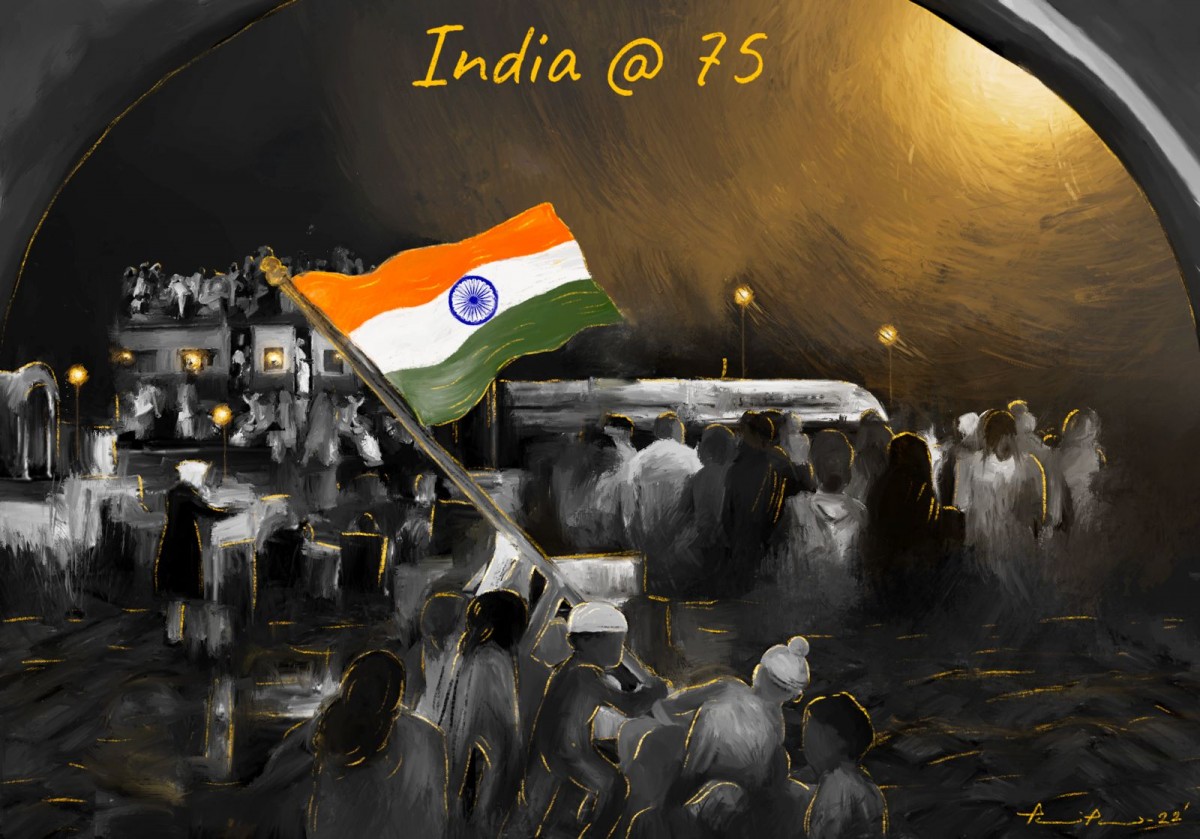As the country waves flags and celebrates the 75th anniversary of India’s independence, it is also time to take stock. What did India’s founders and citizens dream of, how has India fared, what have been our challenges and successes?
The Wire’s reporters and contributors bring stories of the period, of the traumas but also the hopes of Indians, as seen in personal accounts, in culture, in the economy and in the sciences. How did the modern state of India come about, what does the flag represent? How did literature and cinema tackle the trauma of Partition?
Follow us for the next few days to get a rounded view of India@75.

Illustration: Pariplab Chakraborty
Delivered to the Constituent Assembly on August 14, 1947, Jawaharlal Nehru’s speech titled ‘Tryst with Destiny’ has been quoted often in the 75 years since it was first heard.
Signifying both an end and a beginning, the words in the speech are remarkably simple. Yet, they stir a listener, reminding her of the spirit, trials and stories that make independent India.
The following is the text of the speech, produced in full.
§
Long years ago we made a tryst with destiny, and now the time comes when we shall redeem our pledge, not wholly or in full measure, but very substantially.
At the stroke of the midnight hour, when the world sleeps, India will awake to life and freedom. A moment comes, which comes but rarely in history, when we step out from the old to the new, when an age ends, and when the soul of a nation, long suppressed, finds utterance.
It is fitting that at this solemn moment we take the pledge of dedication to the service of India and her people and to the still larger cause of humanity.
At the dawn of history India started on her unending quest, and trackless centuries are filled with her striving and the grandeur of her success and her failures. Through good and ill fortune alike she has never lost sight of that quest or forgotten the ideals which gave her strength. We end today a period of ill fortune and India discovers herself again.
The achievement we celebrate today is but a step, an opening of opportunity, to the greater triumphs and achievements that await us. Are we brave enough and wise enough to grasp this opportunity and accept the challenge of the future?

Illustration: Pariplab Chakraborty
Freedom and power bring responsibility. The responsibility rests upon this assembly, a sovereign body representing the sovereign people of India. Before the birth of freedom we have endured all the pains of labour and our hearts are heavy with the memory of this sorrow. Some of those pains continue even now. Nevertheless, the past is over and it is the future that beckons to us now.
That future is not one of ease or resting but of incessant striving so that we may fulfil the pledges we have so often taken and the one we shall take today. The service of India means the service of the millions who suffer. It means the ending of poverty and ignorance and disease and inequality of opportunity.
The ambition of the greatest man of our generation has been to wipe every tear from every eye. That may be beyond us, but as long as there are tears and suffering, so long our work will not be over.
And so we have to labour and to work, and work hard, to give reality to our dreams. Those dreams are for India, but they are also for the world, for all the nations and peoples are too closely knit together today for anyone of them to imagine that it can live apart.
Peace has been said to be indivisible; so is freedom, so is prosperity now, and so also is disaster in this one world that can no longer be split into isolated fragments.
To the people of India, whose representatives we are, we make an appeal to join us with faith and confidence in this great adventure. This is no time for petty and destructive criticism, no time for ill will or blaming others. We have to build the noble mansion of free India where all her children may dwell.
I beg to move, Sir,
“That it be resolved that:
(1) After the last stroke of midnight, all members of the Constituent Assembly present on this occasion, do take the following pledge: ‘At this solemn moment when the people of India, through suffering and sacrifice, have secured freedom, I………………………….., a member of the Constituent Assembly of India, do dedicate myself in all humility to the service of India and her people to the end that this ancient land attain her rightful place in the world and make her full and willing contribution to the promotion of world peace and the welfare of mankind;
(2) Members who are not present on this occasion do take the pledge (with such verbal changes as the President may prescribe) at the time they next attend a session of the Assembly.”
Jawaharlal Nehru (1889-1964) was India’s first prime minister.
